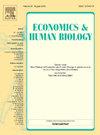Social inequalities in adult mortality across Europe (18th-21st centuries): A critical analysis of theories and evidence
IF 1.8
3区 医学
Q2 ECONOMICS
引用次数: 0
Abstract
This study examines the historical evolution of socioeconomic disparities in adult mortality, with a focus on European societies. Despite the widespread improvements in population health, social inequalities in mortality are a pervasive phenomenon nowadays. This paper employs a critical analysis of both theoretical and empirical literature to investigate major international studies and their findings on longevity differences associated with socioeconomic status from the nineteenth century to the early twenty-first century. Findings reveal that adult mortality trajectories have differed notably across social classes and regions, with some areas exhibiting disparities before the demographic transition and others showing inequalities emerging later. Understanding these long-term health inequality trends sheds light on the changing influence of medical advances and their interplay with economic growth, educational disparities, environmental factors, state roles, and production distribution, which have shaped mortality disparities through different development stages. These factors elucidate the international heterogeneity of results until the mid-twentieth century and offer explanatory insights into observed north-south patterns in Europe. Our findings contribute to a deeper understanding of how advancements in public health, economic development, and social policies have shaped health outcomes over centuries. The implications of this research inform ongoing debates and health policy, emphasizing a nuanced interpretation of historical data to craft effective strategies that address health inequalities today.
欧洲成人死亡率的社会不平等(18 世纪至 21 世纪):对理论和证据的批判性分析。
本研究以欧洲社会为重点,探讨了成人死亡率中社会经济差异的历史演变。尽管人口健康状况得到了普遍改善,但死亡率方面的社会不平等仍是当今普遍存在的现象。本文通过对理论和实证文献的批判性分析,研究了 19 世纪至 21 世纪初与社会经济地位相关的长寿差异的主要国际研究及其发现。研究结果表明,不同社会阶层和地区的成人死亡率轨迹存在明显差异,一些地区在人口结构转型之前就存在差异,而另一些地区则在转型之后才出现不平等现象。通过了解这些长期的健康不平等趋势,我们可以发现医学进步不断变化的影响,以及它们与经济增长、教育差距、环境因素、国家角色和生产分配之间的相互作用,这些因素在不同的发展阶段形成了死亡率差距。这些因素阐明了二十世纪中期之前的国际异质性结果,并为观察到的欧洲南北模式提供了解释性见解。我们的研究结果有助于人们更深入地了解公共卫生、经济发展和社会政策的进步是如何在几个世纪中塑造健康结果的。这项研究的意义为当前的辩论和卫生政策提供了参考,强调对历史数据进行细致入微的解读,以制定有效的战略来解决当今的卫生不平等问题。
本文章由计算机程序翻译,如有差异,请以英文原文为准。
求助全文
约1分钟内获得全文
求助全文
来源期刊

Economics & Human Biology
医学-公共卫生、环境卫生与职业卫生
CiteScore
4.50
自引率
12.00%
发文量
85
审稿时长
61 days
期刊介绍:
Economics and Human Biology is devoted to the exploration of the effect of socio-economic processes on human beings as biological organisms. Research covered in this (quarterly) interdisciplinary journal is not bound by temporal or geographic limitations.
 求助内容:
求助内容: 应助结果提醒方式:
应助结果提醒方式:


